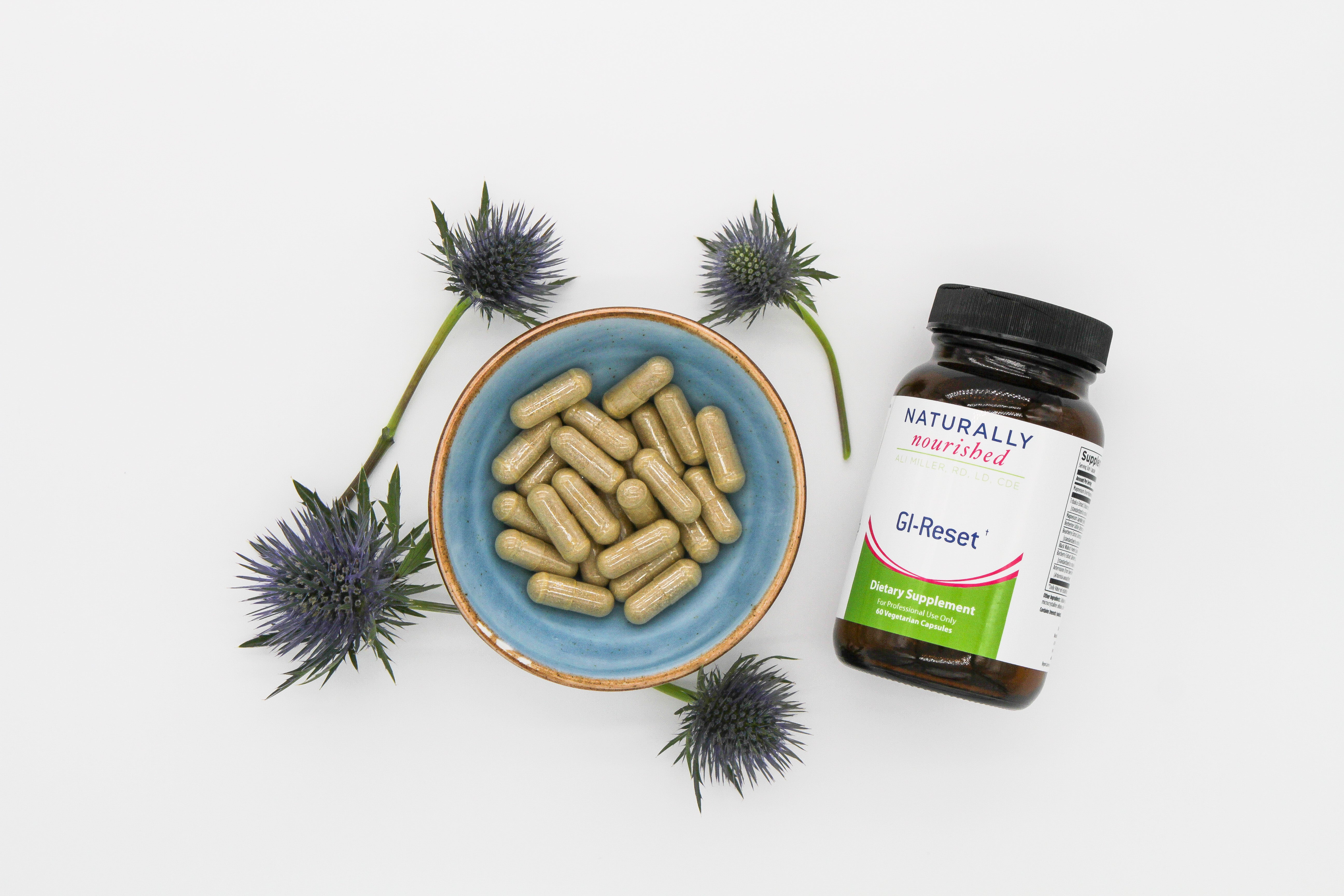



GI Reset
Comprehensive blend of botanical extracts with clinical evidence for supporting a healthy gastrointestinal microbial balance including coverage for concerns such as SIBO, dysbiosis, bloating, parasitic infection, and yeast overgrowth. Learn more
Take 1 capsule twice daily. Best is without food but you may take with food if causing digestive pain or nausea.
Contains 60 capsules which lasts 1 month with typical use.
Note: It is not recommended to use more than 3 bottles consecutively without going through the Bacteria Rebuild Protocol. Often doing the GI Reset as a tool on top of Beat the Bloat Cleanse is most successful.
Safety
- Not recommended while breastfeeding
- Not recommended during pregnancy
-
Not safe for kids
Learn more



Benefits of GI Reset
- Antimicrobial properties
- Anti-viral and immune support
- Anti-fungal properties
- Anti-parasitic
- Urinary tract and bladder support
- Aids in return to microbiome balance
GI Reset is a comprehensive blend of botanical extracts with clinical evidence for supporting a healthy gastrointestinal microbial balance. The botanical substances in the GI Reset provide a wide scope of coverage for concerns such as SIBO, dysbiosis, bloating, parasitic infection, yeast overgrowth and more!
Each ingredient in this product has a long history of use for supporting healthy gut flora. These botanicals include:
Tribulus Extract (also known as puncture vine), a member of the Zygophyllaceae family, is an annual herb found in many tropical and moderate areas
of the world, including the US and Mexico, the Mediterranean region, and
throughout Asia. Its health and medicinal effects are the result of active
phytochemicals steroidal saponins currently referred to by medical
researchers and physicians as X steroidal saponins. These X steroidal
saponins have the ability to influence the entire immune system of the body
and have been shown to have antibacterial and antiviral effects.
Berberine is a bitter-tasting, yellow, plant alkaloid with a long history of
medicinal use in Chinese and Ayurvedic medicine. Berberine is present in
the roots, rhizomes and stem bark of various plants including Berberis
aquifolium (Oregon grape), Berberis vulgaris (barberry), Hydrastis canadensis
(goldenseal), Coptis chinensis (coptis or goldenthread), and Berberis aristata
(tree turmeric). Berberine has also been used historically as a dye, due to its
yellow color. Varma first documented the use of berberine in 1933 for the
eye infection chronic trachoma. There is clinical evidence to support
berberine’s use in the treatment of bacterial diarrhea. Berberine has also
shown antimicrobial activity against bacteria, viruses, fungi, protozoans,
helminths (worms), and chlamydia.
Artemisinin (from Sweet Wormwood; Artemisia annua) demonstrates significant antimicrobial effects and has been traditionally used even in the treatment of malaria. It has a particular historic use of being used to treat parasitic gastrointestinal infections. It is derived from the inner bark (wood) of the Artemesia annua tree and it kills parasites (worms), therefore it became known by the common name of wormwood.
Black Walnut Extract (Juglans nigra) also has a long history of use as an intestinal anti-parasitic (i.e., vermifuge, antihelmitic) in botanical medicine. It also possesses activity against common bacterial and fungal pathogens that occur in GI dysbiosis.
Bearberry Extract (Uva-ursi) is grown throughout Asia, North America, and Europe and has a long history of medicinal use dating back to the 13th Century. The leaves have been used worldwide as a diuretic, astringent, antiseptic and treatment for urinary tract and gastrointestinal infections. A tea brewed with the leaves has
also been used as a laxative. Arbutin, the main chemical constituent of uva ursi, is a phenolic glycoside that becomes hydrolyzed to hydroquinone. Both chemicals contribute to the antiseptic effects in the urinary and GI tracts. Other active constituents include tannins, mono and triterpenes, and flavonoids. Arbutin alone has also been reported to relieve pain from kidney stones, cystitis and nephritis.
Caprylic Acid is found naturally in palm and coconut oil, and in breast milk. Health care practitioners often recommend caprylic acid for use with candidiasis and bacterial infections. Due to its relatively short chain length it has no difficulty in penetrating fatty cell wall membranes, hence its effectiveness in combating certain lipid-coated bacteria, such as Staphylococcus aureus, various species of Streptococcus, and intramucosal Candida. Caprylic acid may affect the fluidity of viral and fungal cell membranes. The lactoperoxidase system in combination with caprylic acid can inhibit the growth of Escherichia coli and Staphylococcus aureus in food. Studies have reported that dietary caprylic acid inhibits the growth of Candida albicans and other opportunistic fungi in both the small and the large intestine. At the same time, caprylic acid does not seem to adversely affect the growth of beneficial intestinal microflora.
Research has shown that these unique botanicals possess a wide array of properties that can help support optimal gut bacteria balance including antibacterial, antiviral, antiparasitic, and antifungal activities. See research tab for studies!
Aging, exposure to antibiotics, poor diet, infection, and stress can all compromise the good gastrointestinal bacteria and disrupt the microbial balance. Combined, the ingredients in GI Reset provide a broad spectrum of activity in order to support a healthy balance of the normal flora.
This formula can be used on its own or in addition to our Beat the Bloat Bundle for comprehensive support.
*These statements have not been evaluated by the Food and Drug Administration. This product is not intended to diagnose, treat, cure or prevent any disease.
**This formula contains various herbs and nutrients which may have contraindicated effects with medications, always check use with your medical team.
Research
References used in details:
1. Bacom A. Incorporating Herbal Medicine Into Clinical Practice. Philadelphia: F.A. Davis; 2002.
2. Chevallier A. Encylopedia of Herbal Medicine. London: Dorling Kindersley; 2000.
3. Fetrow C, Avila J. Professional’s Handbook of Complimentary & Alternative Medicines. Springhouse, PA: Springhouse; 1999.
4. Pizzorno J, Murray M. Textbook of Natural Medicine. 2nd ed. Edinburgh: Churchill Livingstone;1999.
5. Robbers J, Speedie M, Tyler V. Pharmacognosy and Pharmacobiotechnology. Philadelphia: Lippicott Williams & Wilkins; 1996.
6. Werbach M, Murray M. Botanical Influences on Illness. Tarzana, CA: Third Line Press; 1994.
7. Berberine. Altern Med Rev 2000;5(2):175-177.
8. Varma RL. Berberine sulphate in chronic trachoma. Indian Med Gaz 1933;68:122.
9. Khosla, P. K., Neeraj, V. I., Gupta, S. K., and Satpathy, G. Berberine, a potential drug for trachoma. Rev Int Trach.Pathol Ocul Trop Subtrop Sante Publique 1992;69:147-165.
10. Mohan, M., Pant, C. R., Angra, S. K., and Mahajan, V. M. Berberine in trachoma. (A clinical trial). Indian J Ophthalmol. 1982;30(2):69-75
11. Khin, Maung U., Myo, Khin, Nyunt, Nyunt Wai, Aye, Kyaw, and Tin, U. Clinical trial of berberine in acute watery diarrhoea. Br Med J (Clin Res Ed) 12-7-1985;291(6509):1601-1605.
12. Rabbani, G. H., Butler, T., Knight, J., Sanyal, S. C., and Alam, K. Randomized controlled trial of berberine sulfate therapy for diarrhea due to enterotoxigenic Escherichia coli and Vibrio cholerae. J
Infect.Dis 1987;155(5):979-984.
13. Gupte, S. Use of berberine in treatment of giardiasis. Am J Dis child 1975;129(7):866.
14. Sharma R, Joshi CK, and Goyal RK. Berberine tannate in acute diarrhoea. Indian Pediatrics 1970;7(9):496-501.
15. Kamat SA. Clinical trials with berberine hydrochloride for the control of diarrhea in acute gastroenteritis. J Assoc Physicians India 1967;15:525-529.
16. Saksena HC, Tomar VN, and Soangra MR. Efficacy of a new salt of Berberine Uni-Berberine in oriental sore. Current Medical Practice 1970;14:247-252.
17. Purohit SK, Kochar DK, Lal BB, and et al. Cultivation of Leishmania tropica from untreated and treated cases of oriental sore. Indian Journal of Public Health 1982;26(1):34-37.
18. Edwards-Jones V, Buck R, Shawcross SG, Dawson MM, Dunn K. The effect of essential oils on methicillin-resistant Staphylococcus aureus using a dressing model. Burns. 2004 Dec;30(8):772-7.
19. Siegers C, Bodinet C, Ali SS, et al. Bacterial deconjugation of arbutin by Escherichia coli. Phytomedicine 2003;10 Suppl 4:58-60.
20. Sugai T. [Clinical effects of arbutin in patients with chloasma]. Skin Research 1992;34:522-529.
21. McLay, J. C., Kennedy, M. J., Orourke, A. L., Elliot, R. M., and Simmonds, R. S. Inhibition of bacterial foodborne pathogens by the lactoperoxidase system in combination with monolaurin. Int J Food
Microbiol. 2-25-2002;73(1):1-9.
22. Neuhauser, I. Successful treatment of intestinal moniliasis with fatty acid-resin complex. AMA.Arch Intern Med 1954;93(1):53-60
